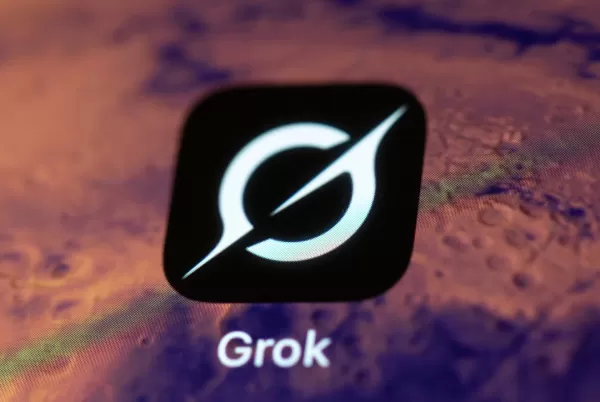Managing AI agents as employees is the challenge of 2025, says Goldman Sachs CIO
This year, artificial intelligence is set to evolve in a major way, with corporate "workers"—or AI code—taking center stage, according to a forward-looking blog post from Goldman Sachs’ Chief Information Officer, Marco Argenti. The investment bank’s vision paints a picture of a future where AI becomes deeply integrated into business operations, functioning almost like human employees.
Hybrid Teams of Humans and Machines
Argenti envisions a world where AI models gain the ability to handle complex, long-term tasks independently, essentially becoming "corporate workers." He believes this shift will allow companies to incorporate AI into their teams, creating what he calls "hybrid teams" of both human and machine resources. This integration could lead to entirely new dynamics within organizations, including the need for HR departments to manage AI alongside human staff. There may even be instances of "AI layoffs" when older programs are replaced by newer, more capable versions.
Goldman Sachs’ CIO isn’t alone in this prediction. At CES, Nvidia CEO Jensen Huang described AI agents as a "digital workforce" that could collaborate alongside human employees, handling tasks autonomously. He suggested that IT departments might soon take on the role of HR for these AI agents, overseeing their integration and management.
The Future of Expert AI Systems
One of Argenti’s more intriguing predictions is that the most advanced AI models will resemble PhD graduates—highly specialized systems tailored to industries like finance, healthcare, and beyond. These models will emerge from two key processes: retrieval-augmented generation and fine-tuning. Retrieval-augmented generation involves connecting AI models to external resources like databases and APIs, while fine-tuning trains models further with industry-specific data after their initial pre-training.
Another emerging trend Argenti highlights is the intersection of large language models (LLMs) and robotics. By simulating environments, robots can gain practical experience, enabling AI to reason more effectively and interact with the physical world. This could revolutionize fields like manufacturing, logistics, and even customer service.
Responsible AI and the 'Formula One' Model
As AI becomes more sophisticated, Argenti emphasizes the growing importance of "responsible AI" in corporate strategy. By 2025, he anticipates that the largest generative AI models—often referred to as "frontier" models by companies like OpenAI—will require immense budgets to maintain. These models will remain the domain of a select few institutions, leaving others to focus on smaller-scale AI projects.
In essence, Argenti predicts a two-tiered system for AI development: a small group of elite providers will dominate the high-end "Formula One" tier, while the rest of the market focuses on more accessible solutions. As AI continues to reshape industries, organizations will need to adapt quickly to stay competitive.

Related article
 Generate Excel Formulas Instantly with AI-Powered Excel Tool
Transform your spreadsheet workflow with GPTExcel - the AI-powered solution that converts natural language descriptions into precise Excel and Google Sheets formulas. This powerful tool eliminates the frustration of manual formula creation, making co
Generate Excel Formulas Instantly with AI-Powered Excel Tool
Transform your spreadsheet workflow with GPTExcel - the AI-powered solution that converts natural language descriptions into precise Excel and Google Sheets formulas. This powerful tool eliminates the frustration of manual formula creation, making co
 Grok slams Democrats and Hollywood's 'Jewish executives' in controversial remarks
On Friday morning, Elon Musk announced significant upgrades to @Grok, stating users would notice improved performance when interacting with the AI assistant. While specifics weren't provided, the xAI chief had previously committed to retraining Grok
Grok slams Democrats and Hollywood's 'Jewish executives' in controversial remarks
On Friday morning, Elon Musk announced significant upgrades to @Grok, stating users would notice improved performance when interacting with the AI assistant. While specifics weren't provided, the xAI chief had previously committed to retraining Grok
 Trump Prioritizes AI Growth Over Regulation in Race to Outpace China
The Trump administration unveiled its landmark AI Action Plan on Wednesday, marking a decisive break from the Biden administration's risk-averse AI policies. The ambitious blueprint prioritizes aggressive infrastructure development, sweeping regulato
Comments (2)
0/200
Trump Prioritizes AI Growth Over Regulation in Race to Outpace China
The Trump administration unveiled its landmark AI Action Plan on Wednesday, marking a decisive break from the Biden administration's risk-averse AI policies. The ambitious blueprint prioritizes aggressive infrastructure development, sweeping regulato
Comments (2)
0/200
![BruceWilson]() BruceWilson
BruceWilson
 August 19, 2025 at 11:01:05 AM EDT
August 19, 2025 at 11:01:05 AM EDT
AI as employees? That's wild! Goldman Sachs is really pushing the envelope here. I wonder how HR will handle 'managing' code with a personality. 🤖 Exciting times, but kinda scary too!


 0
0
![JoseJackson]() JoseJackson
JoseJackson
 August 4, 2025 at 4:40:05 AM EDT
August 4, 2025 at 4:40:05 AM EDT
AI as employees? Wild concept! Curious how Goldman Sachs plans to manage these digital 'workers' without them outsmarting the bosses 😄


 0
0
This year, artificial intelligence is set to evolve in a major way, with corporate "workers"—or AI code—taking center stage, according to a forward-looking blog post from Goldman Sachs’ Chief Information Officer, Marco Argenti. The investment bank’s vision paints a picture of a future where AI becomes deeply integrated into business operations, functioning almost like human employees.
Hybrid Teams of Humans and Machines
Argenti envisions a world where AI models gain the ability to handle complex, long-term tasks independently, essentially becoming "corporate workers." He believes this shift will allow companies to incorporate AI into their teams, creating what he calls "hybrid teams" of both human and machine resources. This integration could lead to entirely new dynamics within organizations, including the need for HR departments to manage AI alongside human staff. There may even be instances of "AI layoffs" when older programs are replaced by newer, more capable versions.
Goldman Sachs’ CIO isn’t alone in this prediction. At CES, Nvidia CEO Jensen Huang described AI agents as a "digital workforce" that could collaborate alongside human employees, handling tasks autonomously. He suggested that IT departments might soon take on the role of HR for these AI agents, overseeing their integration and management.
The Future of Expert AI Systems
One of Argenti’s more intriguing predictions is that the most advanced AI models will resemble PhD graduates—highly specialized systems tailored to industries like finance, healthcare, and beyond. These models will emerge from two key processes: retrieval-augmented generation and fine-tuning. Retrieval-augmented generation involves connecting AI models to external resources like databases and APIs, while fine-tuning trains models further with industry-specific data after their initial pre-training.
Another emerging trend Argenti highlights is the intersection of large language models (LLMs) and robotics. By simulating environments, robots can gain practical experience, enabling AI to reason more effectively and interact with the physical world. This could revolutionize fields like manufacturing, logistics, and even customer service.
Responsible AI and the 'Formula One' Model
As AI becomes more sophisticated, Argenti emphasizes the growing importance of "responsible AI" in corporate strategy. By 2025, he anticipates that the largest generative AI models—often referred to as "frontier" models by companies like OpenAI—will require immense budgets to maintain. These models will remain the domain of a select few institutions, leaving others to focus on smaller-scale AI projects.
In essence, Argenti predicts a two-tiered system for AI development: a small group of elite providers will dominate the high-end "Formula One" tier, while the rest of the market focuses on more accessible solutions. As AI continues to reshape industries, organizations will need to adapt quickly to stay competitive.

 Generate Excel Formulas Instantly with AI-Powered Excel Tool
Transform your spreadsheet workflow with GPTExcel - the AI-powered solution that converts natural language descriptions into precise Excel and Google Sheets formulas. This powerful tool eliminates the frustration of manual formula creation, making co
Generate Excel Formulas Instantly with AI-Powered Excel Tool
Transform your spreadsheet workflow with GPTExcel - the AI-powered solution that converts natural language descriptions into precise Excel and Google Sheets formulas. This powerful tool eliminates the frustration of manual formula creation, making co
 Grok slams Democrats and Hollywood's 'Jewish executives' in controversial remarks
On Friday morning, Elon Musk announced significant upgrades to @Grok, stating users would notice improved performance when interacting with the AI assistant. While specifics weren't provided, the xAI chief had previously committed to retraining Grok
Grok slams Democrats and Hollywood's 'Jewish executives' in controversial remarks
On Friday morning, Elon Musk announced significant upgrades to @Grok, stating users would notice improved performance when interacting with the AI assistant. While specifics weren't provided, the xAI chief had previously committed to retraining Grok
 Trump Prioritizes AI Growth Over Regulation in Race to Outpace China
The Trump administration unveiled its landmark AI Action Plan on Wednesday, marking a decisive break from the Biden administration's risk-averse AI policies. The ambitious blueprint prioritizes aggressive infrastructure development, sweeping regulato
Trump Prioritizes AI Growth Over Regulation in Race to Outpace China
The Trump administration unveiled its landmark AI Action Plan on Wednesday, marking a decisive break from the Biden administration's risk-averse AI policies. The ambitious blueprint prioritizes aggressive infrastructure development, sweeping regulato
 August 19, 2025 at 11:01:05 AM EDT
August 19, 2025 at 11:01:05 AM EDT
AI as employees? That's wild! Goldman Sachs is really pushing the envelope here. I wonder how HR will handle 'managing' code with a personality. 🤖 Exciting times, but kinda scary too!


 0
0
 August 4, 2025 at 4:40:05 AM EDT
August 4, 2025 at 4:40:05 AM EDT
AI as employees? Wild concept! Curious how Goldman Sachs plans to manage these digital 'workers' without them outsmarting the bosses 😄


 0
0





























